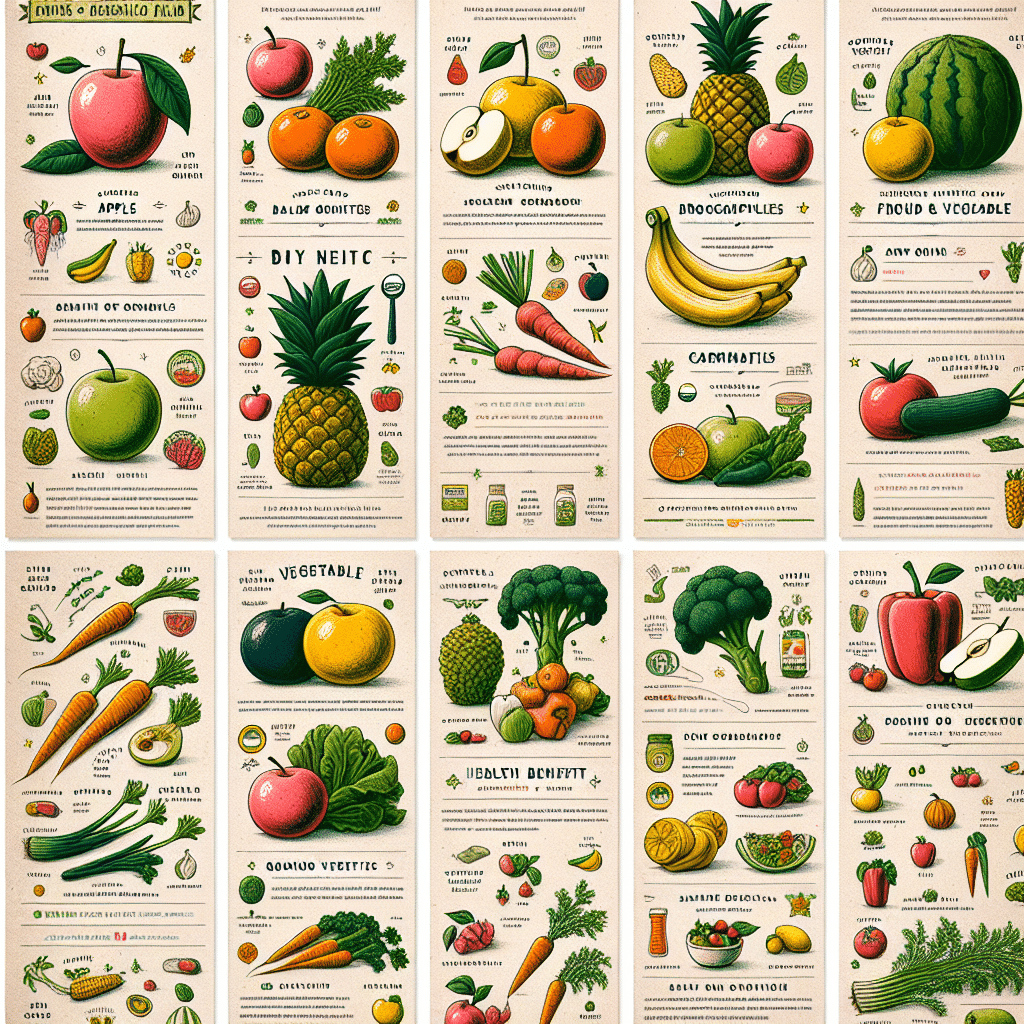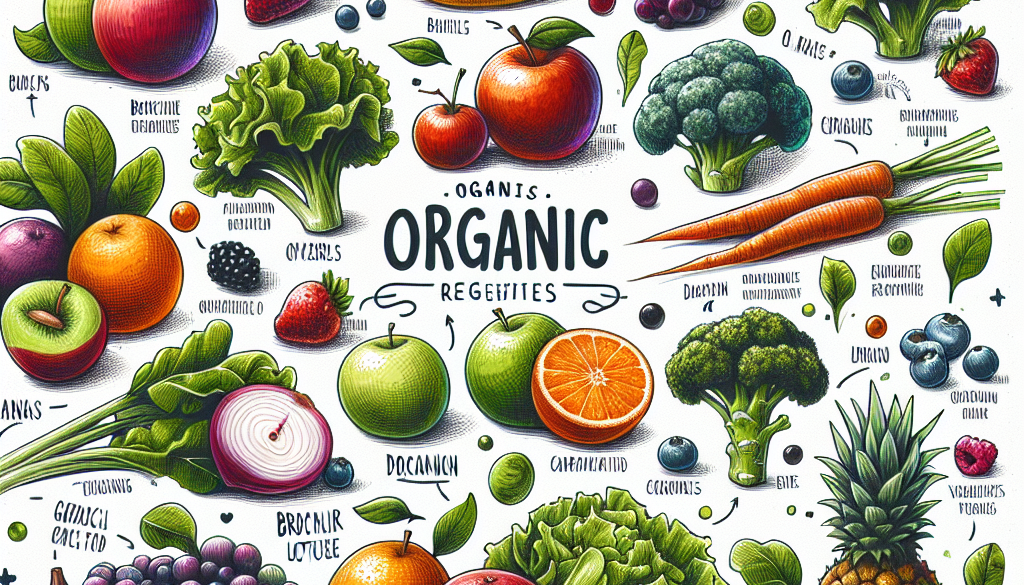Clean Label Guide to Organic Fruits and Vegetables
-
Table of Contents
- Organic Fruits and Vegetables: Your Clean Label Guide
- Understanding Clean Labels and Organic Certification
- The Benefits of Choosing Organic Produce
- Identifying Truly Organic Produce
- Seasonality and Locality: Maximizing the Benefits of Organic Produce
- Organic Produce and Pesticide Residue
- Case Studies: The Impact of Organic Farming
- Statistics: The Growth of the Organic Market
- Challenges Facing Organic Produce
- Conclusion: Embracing Organic for a Clean Label Lifestyle
- Discover ETprotein’s Organic Protein Products
Organic Fruits and Vegetables: Your Clean Label Guide

As consumers become increasingly health-conscious, the demand for clean label products has surged. This trend extends to the produce aisle, where organic fruits and vegetables are often sought after for their perceived purity and nutritional benefits. Understanding what constitutes a clean label, especially when it comes to organic produce, can help consumers make informed choices about the food they eat and the impact it has on their health and the environment.
Understanding Clean Labels and Organic Certification
Clean label is a term that refers to food products containing natural, familiar, simple ingredients that are easy to recognize, understand, and pronounce. The clean label movement advocates for transparency in food labeling and aims to eliminate artificial additives and chemicals from food products.
Organic certification, on the other hand, is a regulated process that ensures food products meet strict government standards. These standards typically include the prohibition of synthetic pesticides, herbicides, and fertilizers, as well as the use of non-GMO seeds. Organic farming practices also promote ecological balance and conserve biodiversity.
The Benefits of Choosing Organic Produce
- Healthier Option: Organic fruits and vegetables are grown without harmful chemicals, potentially reducing your exposure to pesticide residues and other toxins.
- Environmental Impact: Organic farming practices are designed to be sustainable, protecting soil health and reducing pollution.
- Nutritional Content: Some studies suggest that organic produce may have higher levels of certain nutrients, such as antioxidants.
Identifying Truly Organic Produce
To ensure you’re purchasing genuine organic produce, look for the USDA Organic seal or similar certifications depending on your region. This seal indicates that the product has been grown and processed according to federal guidelines. Additionally, be aware of labeling terms such as “natural,” which are not regulated and do not equate to organic.
Seasonality and Locality: Maximizing the Benefits of Organic Produce
Choosing seasonal and local organic produce can further enhance the benefits of clean eating. Seasonal fruits and vegetables are often fresher and more flavorful, while buying local supports community farmers and reduces the carbon footprint associated with transportation.
Organic Produce and Pesticide Residue
While organic produce is grown without synthetic pesticides, it’s important to note that some organic pesticides are allowed. However, these are typically less harmful than their synthetic counterparts. The Environmental Working Group (EWG) publishes an annual list known as the “Dirty Dozen,” which highlights conventionally grown fruits and vegetables with the highest pesticide residues. They also provide the “Clean Fifteen,” a list of produce with the lowest residue levels.
Case Studies: The Impact of Organic Farming
Several case studies have demonstrated the positive effects of organic farming on both health and the environment. For example, a study in Europe found that organic farms supported more biodiversity and better soil quality compared to conventional farms. Another study linked the consumption of organic food to a reduced risk of allergic disease and obesity.
Statistics: The Growth of the Organic Market
The organic food market has seen significant growth over the past decade. According to the Organic Trade Association, sales of organic food in the United States reached $50 billion in 2019, representing a year-over-year increase of 4.6%. This growth reflects a rising consumer preference for clean label and organic products.
Challenges Facing Organic Produce
Despite its benefits, the organic produce industry faces challenges such as higher prices due to more labor-intensive farming practices and lower yields. Additionally, there is ongoing debate regarding the scalability of organic farming to meet global food demands.
Conclusion: Embracing Organic for a Clean Label Lifestyle
Choosing organic fruits and vegetables is a key component of a clean label lifestyle. By opting for organic produce, consumers can enjoy a range of health benefits, support sustainable farming practices, and contribute to environmental conservation. While challenges exist, the growing demand for organic products is a positive sign that more people are prioritizing health and sustainability in their food choices.
Discover ETprotein’s Organic Protein Products
For those looking to complement their clean label diet with high-quality protein, ETprotein offers a range of organic plant-based protein products. Their selection includes organic rice protein, pea protein, and various seed proteins, all of which are non-GMO and allergen-free. ETprotein caters to a variety of industries, ensuring that consumers can find the right protein to meet their dietary needs.
About ETprotein:
ETprotein, a reputable plant protein vegan protein Chinese factory manufacturer and supplier, is renowned for producing, stocking, exporting, and delivering the highest quality organic bulk vegan protein and plant proteins. They include Organic rice protein, clear rice protein, pea protein, clear pea protein, watermelon seed protein, pumpkin seed protein, sunflower seed protein, mung bean protein, peanut protein etc. Their offerings, characterized by a neutral taste, non-GMO, allergen-free attributes, cater to a diverse range of industries. They serve nutraceutical, pharmaceutical, cosmeceutical, veterinary, as well as food and beverage finished product distributors, traders, and manufacturers across Europe, USA, Canada, Australia, Thailand, Japan, Korea, Brazil, and Chile, among others.
ETprotein specialization includes exporting and delivering tailor-made protein powder and finished nutritional supplements. Their extensive product range covers sectors like Food and Beverage, Sports Nutrition, Weight Management, Dietary Supplements, Health and Wellness Products, and Infant Formula, ensuring comprehensive solutions to meet all your protein needs.
As a trusted company by leading global food and beverage brands and Fortune 500 companies, ETprotein reinforces China’s reputation in the global arena. For more information or to sample their products, please contact them and email sales(at)ETprotein.com today.














